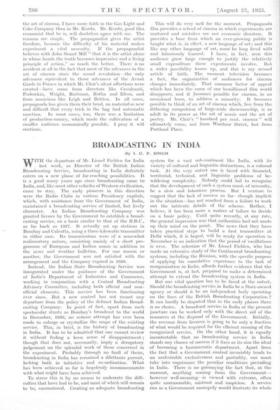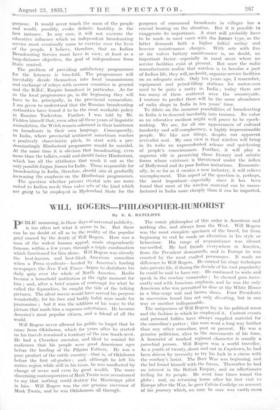BROADCASTING IN INDIA
By I. G. P. SINGE
WITH the departure of Mr. Lionel Fielden for India -V last week, as Director of the British Indian Broadcasting Service, broadcasting in India definitely enters on a new phase of far-reaching possibilities. It is a good many years ago since broadcasting came to India, and, like most other vehicles of Western civilisation, came to stay. The early pioneers in this direction were the Radio Clubs in various Presidency capitals, which, with assistance from the Government of India, maintained a broadcasting service of limited, but lively character. An Indian Broadcasting Company was granted licence by the Government to establish a broad- casting service, on a basis similar to that of the BJ3.C., as far back as 1927. It actually set up stations in Bombay and Calcutta, using a three-kilowatts transmitter in either case. Its transmissions were of a somewhat rudimentary nature, consisting mainly of a short pro- gramme of European and Indian music in addition to the news and weather bulletins. For one reason or another, the Government was not satisfied with the arrangement and the Company expired in 1930.
Instead, the Indian State Broadcasting Service was inaugurated under the guidance of the Government of India's Department of Industries and Commerce, working in conjunction with a Central Broadcasting Advisory Committee, including both official and non- official elements. This service has been functioning. ever since. But a new control has not meant any departure from the policy of the defunct Indian Broad- casting Company. In point of fact, apart from such spectacular stunts as Bombay's broadcast to the world in December, 1933, .no serious attempt has ever been made to enlarge or crystallize the scope of the existing service. This, in brief, is the history of broadcasting in India. It has to be admitted that one cannot review it without feeling a keen sense of disappointment ; though that does not, necessarily, imply a derogatory judgement on the splendid work' of those concerned in the experiment. Probably through no fault of theirs, broadcasting in India has remained a dilettante pursuit, lacking both in initiative and co-ordination. What has been achieved so far is hopelessly incommensurate with what might have been achieved.
To stress this is by no means to underrate the diffi- culties that have had to be, and most of which still remain to be, encountered. Creating an adequate broadcasting system for a vast sub-continent like India, with its variety of cultural and linguistic distinctions, is a colossal task. At the very outset one is faced with financial, territorial, technical, and linguistic problems of be- wildering complexity. Nobody could fail to recognize that the development of such a system must, of necessity, be a slow and laborious process. But I venture to suggest that the lack of success so far—though implicit in the situation—has not resulted from a failure to work out the intricate details of the scheme. Rather, I believe, it has been more a matter of failure to decide on a basic policy. Until quite recently, at any rate, the general impression was that authorities had not made up their mind on the point. The news that they have taken practical steps to build a first transmitter at Delhi which, it is hoped, will be ready for operation in November is an indication that the period of vacillations is over. The selection of Mr. Lionel Fielden, who has made an extensive study of the Continental broadcasting systems, including the Russian, with the specific purpose of applying his cumulative experience to the task of reorganization in India, affords further evidence that the Government is, at last, prepared to make a determined attempt to extend the broadcasting system in India. But one vital question has to be faced at the outset. Should the broadcasting service in India be a State-owned agency or, should it be an independent body operating on the lines of the British Broadcasting Corporation ? It can hardly be disputed that in the early phases there is no choice. A broadcast service in India at the present juncture can be worked only with the direct aid of the resources at the disposal of the Government. Initially, the revenue from licences is going to be only a fraction of what would be required for the efficient running of the reorganized service. On the other hand, it is equally incontestable that no broadcasting service in India stands any chance of success if it fixes as its aim the ideal of becoming a bureaucratic department. Apart from the fact that a Government control invariably tends to an undesirable exclusiveness and partiality, one must take into cognizance the peculiar conditions prevailing in India. There is no gainsaying the fact that, at the moment, anything coming from the Government— however well-meaning—is viewed with extreme, often quite unreasonable, mistrust and suspicion. A service run as a Government monopoly would frustrate its whole. purpose. It would never touch the mass of the people and would, possibly, evoke definite hostility in the first instance. In any case, it will not exercise the educative influence which an independent broadcasting - service must eventually come to exercise over the lives of the people. I believe, therefore, that an Indian • Broadcasting Service must have in view; at least as a long-distance objective, the goal of independence from State control.
The problem of providing satisfactory programmes for the listeners is two-fold. The programmes will inevitably divide themselves into local transmissions and exchange of relays with oversee, countries in general and the B.B.C. Empire broadcast in particular. As far as the local programmes go, in the beginning they will have to be, principally, In the provincial vernaculars. I am given to understand that the Russian broadcasting authorities have found it to be the most workable policy in Russian Turkestan. Further, I was • told by Mr. Pielden himself that, even after all these years of linguistic assimilation, the Welsh remain adamant in their insistence on broadcasts in their own language. Consequently, in India, where provincial sentiment sometimes reaches a positively chauvinistic pitch, to start with a pre- dominatingly Hindustani programme would be suicidal. • At the same time it is obvious that broadcasting, even more than the talkies, could and should foster Hindustani, which has all the attributes that mark it out as the only possible lingua franca for India. • Those responsible for broadcasting in India, therefore, should aim at gradually increasing the emphasis on the Hindustani programmes.
The question whether private crystal sets are more suited to Indian needs than valve sets of the kind which are going to be employed in Hyderabad State for the purposes of communal broadcasts in villages has a crucial bearing on the situation. But it is possible to exaggerate its importance. A start will probably have to be made in most cases with the former type, as the latter demands both a higher initisl outlay and heavier maintenance charges. With sets with five or six valves battery maintenance is, no doubt, an important factor—especially in rural areas where no service facilities exist at present. But once the radio manufacturers realize that wireless is to beco;ne a part of Indian life, they will, no doubt, organize service facilities on an adequate scale. Only ten years ago, I remember, • equipment and petrol-filling stations for motor-cars used to be quite a rarity in India today there are too many of them scattered over the countryside. I venture to predict there will be the same abundance of radio shops in India in ten years' time. To dilate on the immense possibilities of broadcasting in India is to descend inevitably into truisms. Its value RS an educative medium might well prove to be epoch- making. We are, for all our appearances of cultural insularity and self-complacency, a highly impressionable people. We like new things, despite our apparent revivalist zeal. My own view is that wireless will bring in its wake an unprecedented release and quickening of people's consciousness. Further, it will play a supreme role in preserving those literary and artistic forms whose existence is threatened under the influx of Hollywood and its poor Indian imitations. Economic- ally, in so far as it creates a new industry, it will relieve unemployment. This aspect of the question is, perhaps, the most important—especially since it has been found that most of the wireless material can be manu- factured in India more cheaply than it can be imported.



































 Previous page
Previous page